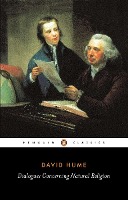In the posthumously published Dialogues Concerning Natural Religion, the Enlightenment philosopher David Hume attacked many of the traditional arguments for the existence of God, expressing the belief that religion is founded on ignorance and irrational fears. Though calm and courteous in tone - at times even tactfully ambiguous - the conversations between Hume's vividly realized fictional figures form perhaps the most searching case ever mounted against orthodox Christian theological thinking and the 'deism' of the time, which pointed to the wonders of creation as conclusive evidence of God's Design. Hume's characters debate these issues with extraordinary passion, lucidity and humour, in one of the most compelling philosophical works ever written.
For more than seventy years, Penguin has been the leading publisher of classic literature in the English-speaking world. With more than 1,700 titles, Penguin Classics represents a global bookshelf of the best works throughout history and across genres and disciplines. Readers trust the series to provide authoritative texts enhanced by introductions and notes by distinguished scholars and contemporary authors, as well as up-to-date translations by award-winning translators.


